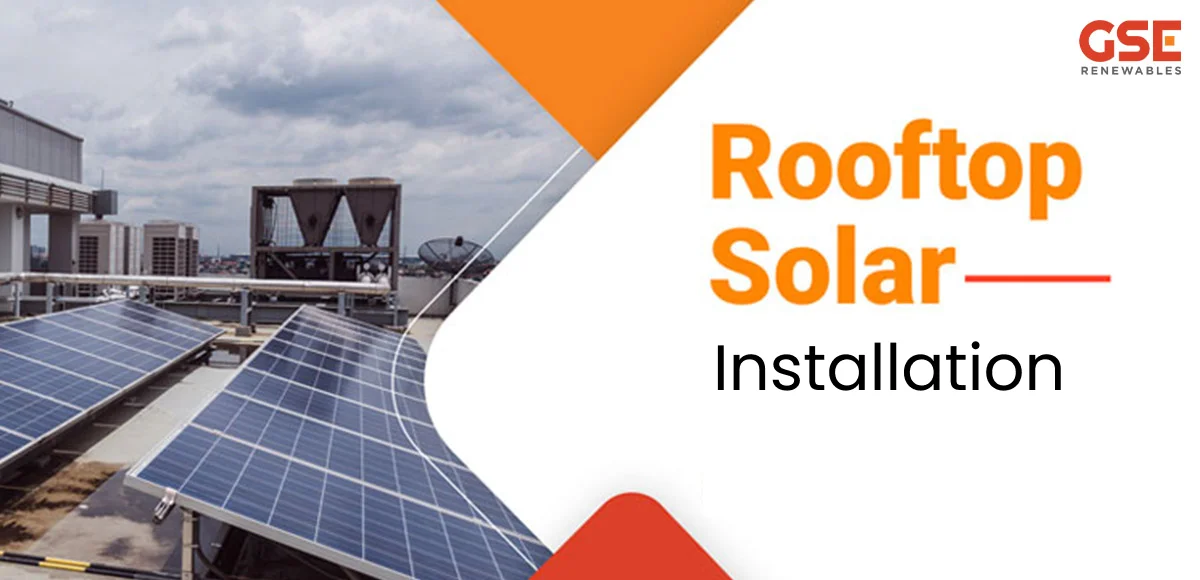Solar Opex Model: For Rooftop Solar with No Upfront Investment
Oct 15

Solar rooftop installation provides an intelligent solution for both lowering electricity expenses and implementing sustainable power systems. GSE Renewable Energy operates as a reputable solar installation company that develops tailored solar power systems for industrial and commercial buildings. The unused rooftop areas of your building can be converted into an economical power generation system.
Our rooftop solar panel installation services decrease energy expenses while providing customers with affordability against grid electricity as well as raising the market worth of their properties. The adoption of solar power permits you to reduce expenses while creating an environment that is cleaner and greener simultaneously.
We are the leading rooftop solar company in India to develop efficient solar systems specifically designed for customer energy requirements. A team of experts at our company provides seamless execution of installations together with long-lasting energy benefits through planning and design decisions followed by installation and maintenance services. Contact GSE Renewable Energy to receive 100% guaranteed solar power systems through affordable rooftop installation.
Solar rooftops represent solar power systems which find their placement on commercial and industrial building rooftops. Photovoltaic cells utilize sunlight energy to generate electricity as they function as a sustainable renewable power generation method. These systems serve as an excellent power generation method because they produce no dangerous emissions or environmental pollutants. A business can achieve lower electricity costs and environmental sustainability through the installation of solar rooftop systems. Your power system requirements determine if you need either a grid-connected system or a system equipped with batteries for power backup.
Rooftop solar panel installation has become a fast-growing method through which Indian businesses obtain their energy needs. A growing number of businesses across India select solar rooftop systems because they provide both cost savings and environmental benefits to power their facilities.
Renewable energy has established India as a worldwide leader in this sector. The percentage of renewable power generation capacity in India reached 35% during recent years. Solar roof installation demonstrates the highest growth rate in renewable energy because it achieved a compound annual growth rate (CAGR) of 116% between 2012 and 2018.
Rooftop solar grid projects receive US$625 million from the World Bank as part of its efforts to help India achieve its 227 GW renewable energy capacity target.
Opting for a solar rooftop for business helps reduce energy costs, minimize your carbon footprint & boost energy independence. The present moment represents an ideal opportunity to start or improve your energy system through solar rooftop installation.
Businesses should install rooftop solar panels because this strategy allows them to decrease their energy expenses while adopting renewable clean power sources. The growing interest in sustainable solutions drives people toward solar roof installation which enables them to reduce their use of traditional electricity while decreasing their carbon emissions. You need to develop proper plans before making any system commitment. Before starting rooftop solar panel installation you need to evaluate seven critical factors which include:
Businesses should use rooftop solar solutions to gain sustainability and intelligence. These are the main advantages that come from investing in solar roof installations:
GSE Renewables operates as India’s top solar rooftop company which focuses on installing solar panels on industrial and commercial building rooftops. The company provides top-tier solar rooftop installation solutions that span from 100 kW to 500 kW and extend to 1 MW to 5 MW capacities to serve businesses of all sizes seeking clean sustainable energy solutions.
Our team possesses joint experience of more than 250 years and has handled 30 MW of solar energy projects successfully which makes them competent to tackle each installation challenge and deliver optimal performance and efficiency. Businesses that select GSE Renewables for installation of their rooftop solar system will decrease their electricity expenses and help create a sustainable environment. The GSE Renewables provides solar energy solutions to interested customers through their network.
A solar rooftop is a photovoltaic (PV) system where solar panels are mounted on the roof of a home, commercial building, or other structure to generate electricity. These systems include panels, inverters, mounting structures, and wiring. Residential systems typically range from 1 to 20 kW, while commercial rooftop systems can be 100 kW or more.
Yes, installing solar panels on roofs is safe when done by professionals. Expert rooftop solar installers assess your roof’s structural strength before installation to ensure safety and long-term performance.
In India, the solar rooftop installation cost ranges from ₹50,000 to ₹70,000 per kilowatt (kW), including installation. The final cost depends on the system size, panel quality, and type of installation.
A 1 kW solar rooftop system typically needs 10 square meters (100 square feet) of shadow-free space. So, a 10 kW system would need about 100 square meters of rooftop space.
Solar roof panels require low maintenance. Occasional cleaning to remove dust and dirt, along with routine checks by rooftop solar providers like Vandana Agencies, ensures efficient operation.
Yes, solar panels still work in cloudy or rainy weather, though with slightly lower efficiency. They can generate power using diffuse sunlight, keeping your system active year-round.
The solar rooftop installation process involves five key steps:
Our Blogs With a combined experience of over 250 years and the successful management of 30 MW of solar energy projects, GSER offers the most efficient solutions. Solar Opex Model: For Rooftop Solar with No Upfront Investment What is the OPEX Model in Solar Energy?...
Read MoreOur Blogs With a combined experience of over 250 years and the successful management of 30 MW of solar energy projects, GSER offers the most efficient solutions. 912 kWp Solar Rooftop for Industries for a Leading Forging Plant in Pune From heavy presses to heat-intensive...
Read MoreOur Blogs With a combined experience of over 250 years and the successful management of 30 MW of solar energy projects, GSER offers the most efficient solutions. Save on Solar Energy – How to Reduce Electricity Cost Grid tariffs are rising, and current indications suggest...
Read More